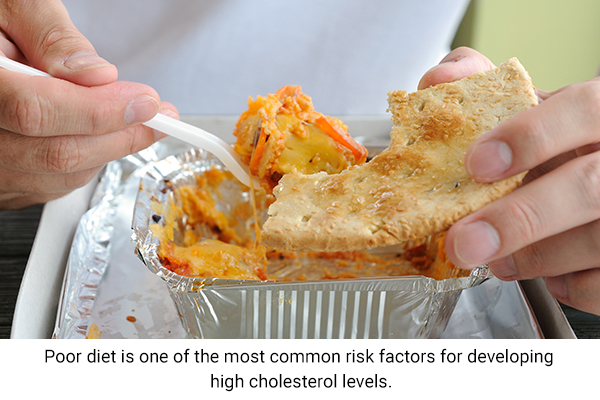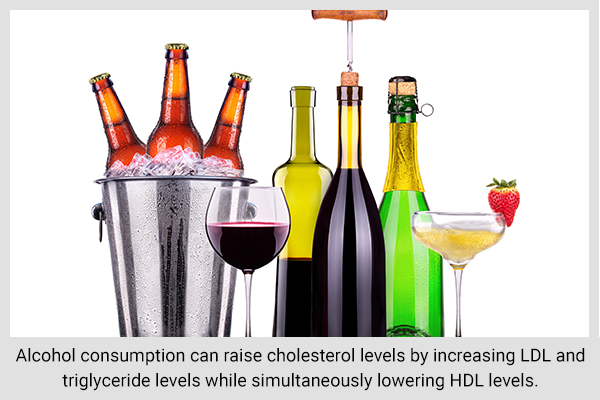In this article:
Cholesterol is a substance that’s found in your blood. It’s essential for your body to function, but too much cholesterol can be detrimental to your health. High cholesterol can lead to heart disease, stroke, and other problems.

There are two types of cholesterol, namely, low-density lipoprotein (LDL) and high-density lipoprotein (HDL). LDL is the “bad” cholesterol since it can build up in your arteries and lead to the formation of plaque. HDL is “good” cholesterol and helps remove LDL from your blood vessels.
You can have too much of either type of cholesterol, but having high LDL levels is more likely to cause problems. (1)
Causes and Risk Factors of High Cholesterol
The following factors can lead to a rise in cholesterol levels.
1. Lack of exercise
If you don’t exercise, you’re at risk for higher cholesterol levels. Even if you have no other risk factors, a sedentary lifestyle can contribute to high cholesterol levels.
Exercise helps in increasing levels of HDL and lowering levels of LDL. (2) It also helps to lower triglycerides, another type of fat in the blood that may contribute to heart disease. (3)
2. Poor diet

Poor diet is one of the most common risk factors for developing high cholesterol levels. A diet high in saturated (unhealthy fats that are solid at room temperature, such as butter) and trans fats (fats from processed foods) can raise your cholesterol level, while a diet high in fiber and healthy fats can lower it. (4)
When it comes to food intake, consider the following:
- Avoid processed foods, red meat, and sugary drinks. You can choose alternative options of protein such as fish, poultry, and beans.
- You can lower your LDL level by consuming less saturated fat. Saturated fat is found in animal products including meat, butter, and cheese. It’s also found in some plant oils, such as coconut oil. You can also raise your HDL by eating healthier fats, such as the omega-3 fatty acids found in fish, dried fruits, nuts, and seeds. Omega-3 fatty acids can be found in certain types of fish oil supplements.
- A diet low in fiber is a major risk factor for high cholesterol levels. Fiber is essential for keeping cholesterol levels in check. A diet lacking in fiber can lead to an increase in bad cholesterol and a decrease in good cholesterol. This can eventually lead to atherosclerosis, or hardening of the arteries, which may eventually lead to heart disease. The best way to lower your risk of high cholesterol levels is to eat a diet rich in fiber. Good sources of fiber include vegetables, fruits, whole grains, beans, and legumes. Aim for at least 25 grams of fiber per day. (4)(5) Also, be sure to include plenty of water in your diet to keep things moving smoothly.
- Avoid eating salty/deep-fried foods. Eating foods that are high in salt or that have been deep-fried can increase your risk of developing high cholesterol levels. Salt can make the body retain water, which can lead to an increase in blood pressure. Deep-fried foods are high in saturated fats, which can increase cholesterol levels. To help lower your risk of high cholesterol levels, limit your intake of salty and deep-fried foods. (6)
- Avoid too much red meat intake. When it comes to cholesterol, too much of any good thing can quickly become a bad thing. That’s why it’s important to limit your intake of red meat, which is high in saturated fats and can increase your cholesterol level.
- Saturated fat is the main culprit when it comes to raising your cholesterol levels. And red meat is one of the biggest contributors of saturated fat to the diet. Eating too much red meat has been linked to an increased risk of heart disease, stroke, and other cardiovascular problems. So if you’re looking to lower your cholesterol levels, it’s best to limit your intake of red meat, or at least include high-quality plant-based foods. (6)
3. Alcohol

The link between alcohol and cholesterol is well established. Alcohol consumption can raise cholesterol levels by increasing LDL and triglyceride levels while simultaneously lowering HDL levels. (7)
Even moderate alcohol consumption can have these effects, so it’s important to be mindful of your intake if you’re trying to lower your cholesterol level. If you do drink alcohol, limit yourself to one drink per day for women or two drinks per day for men.
4. Smoking
Smoking is one of the most important risk factors for high cholesterol levels. Cigarette smoke contains many chemicals that can damage LDL particles, making them more likely to stick to your artery walls. This can lead to a deposition of plaque in your arteries, which can narrow them and make it difficult for blood to flow through. (8)
There are a few things you can do to lower your risk of high cholesterol levels if you smoke. First, try to quit smoking. If you can’t quit, then try to cut back on the number of cigarettes you smoke. You should also avoid exposure to secondhand smoke (8)
Finally, make sure you get regular checkups and screenings so that your doctor can catch any problems early.
5. Stress

A high cholesterol level is a serious problem because it can lead to heart disease, stroke, and other health problems. There are many risk factors for high cholesterol levels, but there are also things you can do to lower your risk.
One of the risk factors for high cholesterol levels is stress. When you’re stressed, your body produces more of the hormone cortisol. Cortisol raises your blood sugar levels and makes your body store more fat. This can lead to weight gain and higher cholesterol levels. (9)(10)
You can lower your stress levels by getting enough sleep, exercising regularly, and managing your time effectively. You can also try relaxation techniques, yoga, and meditation.
6. A family history of high cholesterol levels
Familial hypercholesterolemia (FH) is a genetic kind of high cholesterol condition that can be passed from parent to kid. People with FH manufacture more cholesterol than their bodies can safely handle from birth, which leads to a buildup of fat and plaque in the arteries that can eventually result in serious issues.
The three most common genetic variants are known to decrease LDL receptor function, reduce LDL uptake, and cause high concentrations of LDL, which is bad cholesterol.
There are several lifestyle adjustments you may make if high cholesterol levels run in your family to help reduce your risk. (11)
How to Lower High Cholesterol Levels

A high cholesterol level is a serious health problem that can lead to heart disease and stroke. Fortunately, there are ways to lower your cholesterol and reduce your risk of serious conditions.
- Diet: Eating a healthy diet is one of the best ways to lower cholesterol. Focus on eating plenty of fruits, vegetables, and whole grains. Avoid processed foods, saturated fats, and trans fats. (4)
- Exercise: Regular exercise can help raise your HDL levels and lower your LDL levels. Aim for 30 minutes of moderate exercise at least 5 days a week. (2) If you are overweight or obese, losing weight can help lower your cholesterol levels. Even a small weight loss can make a big difference.
- Medications: If lifestyle changes alone aren’t enough to lower your cholesterol levels, your doctor may prescribe medications such as statins. These drugs can be very effective in reducing LDL levels and preventing heart disease. (12)
- Healthy habits: Avoid smoking and alcohol as they can increase LDL levels and reduce HDL levels. (8)
Most-Asked Questions About High Cholesterol Levels
Why is my cholesterol level high even with medication?
Genetic factors could cause you to have high levels of cholesterol. (11) If your current medication is not controlling your cholesterol levels, you may need to consult your doctor and modify your medication and lifestyle factors such as stress, sleep, and diet.
Can drugs cause high levels of cholesterol?
Yes, certain medications can cause high cholesterol levels. Some of the more well-known prescription medications that adversely affect lipid levels include cardiovascular drugs, antipsychotics, anticonvulsants, hormones, and specific immunosuppressants. (13)
Final Word
Having high levels of cholesterol is a serious health challenge that needs to be carefully monitored. Now that you are aware of possible risk factors, it is in your hands to take steps to reduce high cholesterol levels and improve your health by making a few simple lifestyle changes.
- Was this article helpful?
- YES, THANKS!NOT REALLY


